Newsletter: Escapes: This March Madness? It’s flowers, not basketball, feeding our frenzy
- Share via
Have Southern Californians gone a little bit overboard in our flower frenzy? All signs point to yes.
But there’s a scientific reason for this, which is a relief: Flowers make us happy.
That’s the conclusion of Loretta G. Breuning writing in Psychology Today: They trigger “your happy brain chemicals”: dopamine, oxytocin and serotonin.
My name is Catharine Hamm, and I’m the travel editor for the Los Angeles Times and an admitted floral fanatic. Judging by the masses of people looking for wildflowers and associated blooms, I’m in good company.
At least, mostly good company. There are some bad seeds out there. We have heard of people picking the flowers, wandering off the paths and sitting or lying down in pursuit of the ultimate selfie. And one couple even landed a helicopter at the popping-with-poppies Antelope Valley. Uh huh.
In our effort to make you and keep you happy, we also tell you where to see more organized (that is, probably not wildflowers) blooms and direct you to other wildflower places in the West where the bloom will go on long after ours has died out.
We also have news and ideas: The Palm Springs Aerial Tram is reopening, a famous wax museum is inviting you to sleep among the stars, and our favorite flight attendant columnist tells you how to file a complaint if you’re aggrieved (but to make sure your issue is legitimate). And if you can’t get enough of the outdoors, even for those who use mobility equipment, we tell you that too.
It’s a veritable feast complete with visuals. We invite you to this banquet. And make sure you don’t skip dessert — our end paper. Enjoy.
Flowers, flowers everywhere
We’re crazy about flowers, but we’re not crazy. That’s why we offer you other ways to see the flowers:
-- If you like your flowers in slightly more organized fashion than the happenstance of wildflowers, Kelly Merritt writes about bulbs and blooms you can always find, no poking around in far-flung corners of the U.S. Here are several places in the U.S. where you can get your flower fix.
-- Mary Forgione attended a news briefing Tuesday morning at the Antelope Valley California Poppy Reserve, and here was the takeaway from that: It’s only going to get better.
-- If you miss the California wildflower bloom, you still can find it in other Western states, particularly the very mountainous ones, Sara Cagle writes. Crested Butte, Colo., calls itself the wildflower capital of the U.S., but Texas puts on quite a show with its bluebonnets.
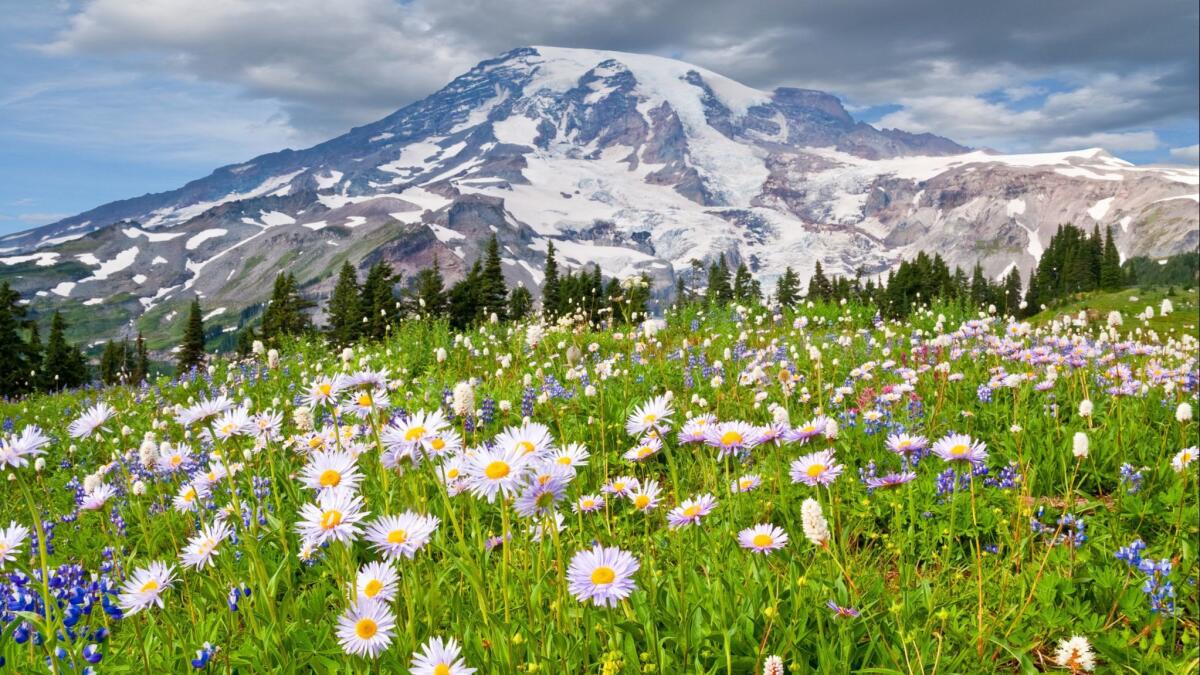
Meanwhile, howdy, big boys
Saguaro cactuses are the redwoods of the desert; they may grow as tall as 50 feet and live to be 200 years old. Seeing them in person is a different experience from seeing a photo, and Jay Jones tells you how to get a different view of them on a Weekend Escape to Phoenix. Best of all, you can celebrate them with a prickly pear margarita.
Ready to take us to new heights again
Our favorite ride is almost back. The Palm Springs Aerial Tramway is expected to reopen April 1, now that repairs have been completed to the road on the way to the tram. It has been closed six weeks, Mary Forgione writes, which also means it lost about $4 million in revenue.
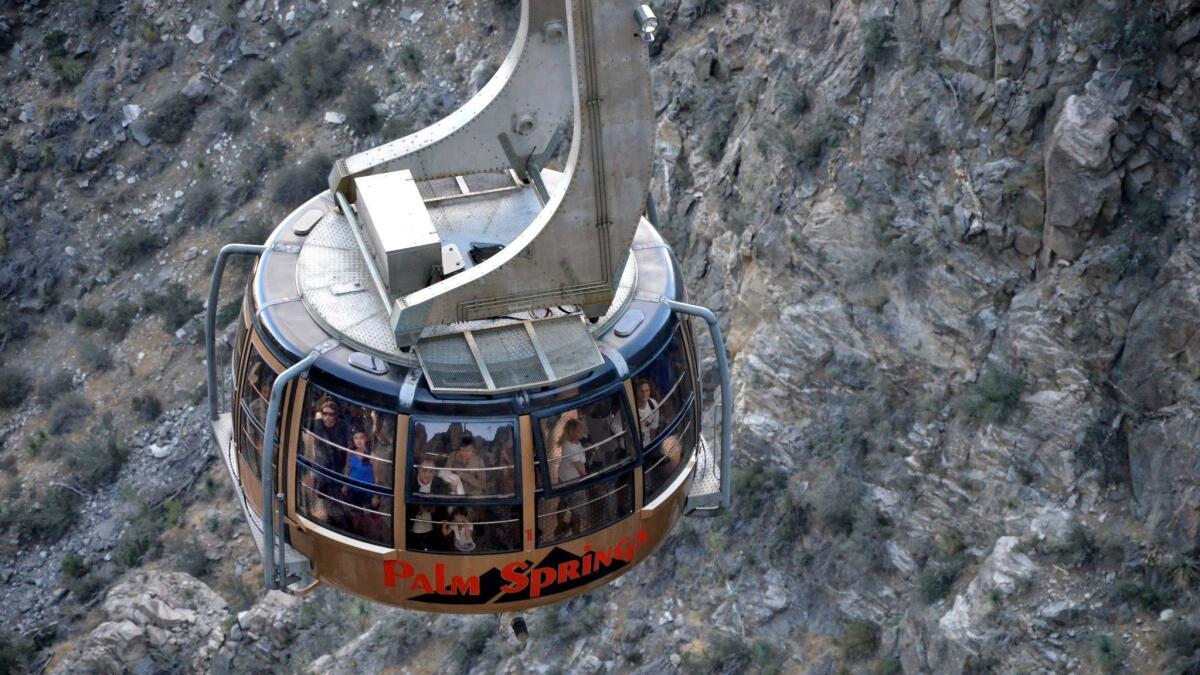
You can’t predict nature, but you can be prepared
After a spinal cord injury, Steve Dalton of San Pablo, Calif., said the outdoors was restorative. “It’s an opportunity to challenge myself,’’ he said, “and create situations where you have to problem-solve, you have to test the skills that you have as a [wheel]chair user to deal with terrain that’s not well-groomed.” If you deal with mobility issues, how do you get the most out of being outdoors without the outdoors getting the better of you? Yomi Wrong writes in All Systems Go about how to counteract the unpredictability of nature.
That’s the way the toilet paper rolls
Elliott Hester has been a flight attendant for more than 30 years, so he has plenty of stories about flying and the public. His most recent Fly Guy column recounts some of the ways that passengers try to get even with flight attendants for behaviors or situations they find offensive. Even Hester was jaw-dropped when a passenger, clearly angry, unloaded on him for toilet paper that rolled the wrong way. If you do have a complaint, you should file one, he writes (and tells you how), but wayward TP? No way.
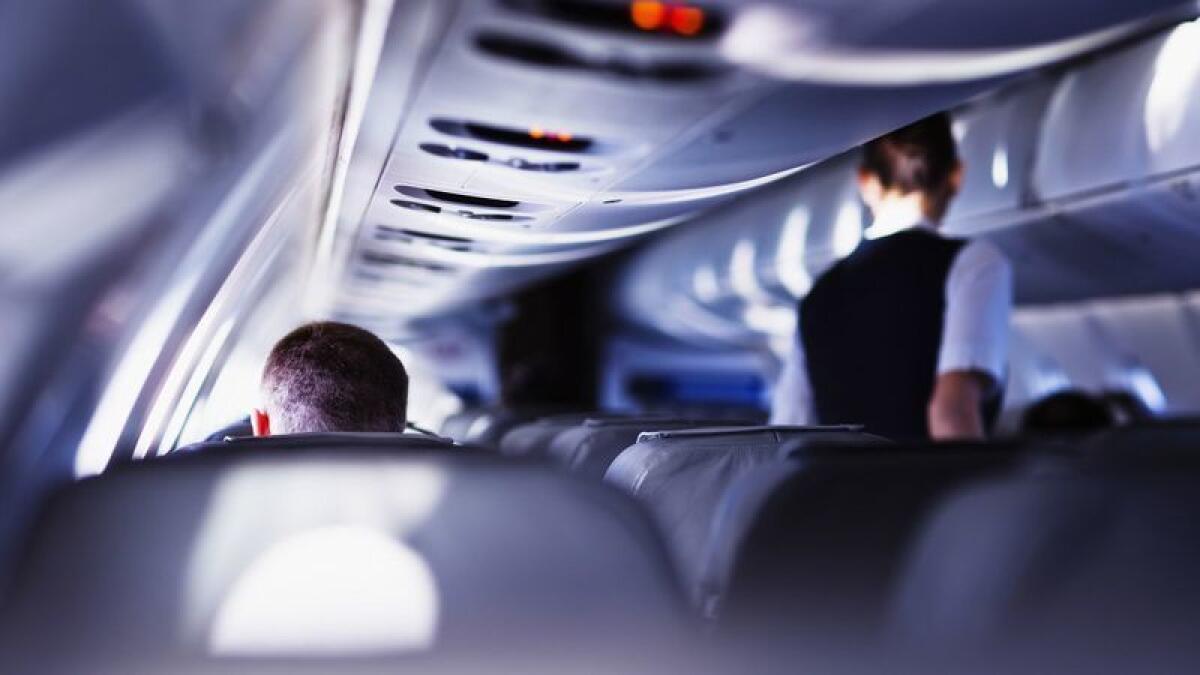
Where you can snuggle with celebs
Mary Forgione waxes poetic, sort of, in this bit of lodging news: You can sleep among the wax figures of Madame Tussauds in Hollywood, Las Vegas and five other places in special pop-up rooms. You’ll need to make your reservation by today if you want to sleep with the stars. Creepy or cool? You be the judge.
Enjoying the salad days of modern farming, in flight
Even if you’re in a premium seat on an airline and you get a meal, it sometimes doesn’t taste exactly like the essence of fresh. Singapore Airlines is trying to change that, thanks to aeroponics, a new method of growing greens. A onetime steel mill is now a garden of eatin’, thanks to a method allowing crops (such as greens) to mature faster and use less water. Because the “farm” is less than five miles from the airline’s catering kitchen, freshly cut greens can go from urban farm to seat-back tray table in as little as a day. The bigger question: Is this the future of farming?
These roads can take a toll on you
After an article about a Hertz settlement with the city of San Francisco, readers responded with their own tales of toll road rental car woes in the Travel section’s letters column. Many times, they felt they had been duped into agreeing to pay for a transponder that then ended up costing far more than the toll-road charge. Two readers gave a couple of ideas on defeating the thieving transponders, and there is a link to a slew of missives from other readers who feel as though they got rooked by their rental car company.

This might be a cut above
Who knew getting a shave and a haircut could be so fun? This Las Vegas barbershop at the Cosmopolitan is a sheer pleasure if you factor in the stuff with the swizzle stick: It has a bar that looks like a speakeasy and the drinks menu is lively and innovative, Jay Jones writes. Plus it stays open until midnight in case you need an emergency trim.
What we’re reading
I have a hard time thinking about astronaut Neil Armstrong being the honorary president of a 1976 expedition to Ecuador that was seeking what Atlas Obscura calls a “‘metallic library’ supposedly left by a lost civilization aided by extraterrestrials.” But there it is. Blame Erich von Däniken, who wrote “The Gold of the Gods” and set off a small tsunami of people looking for gold. The Armstrong-affiliated group went to Cueva de los Tayos in Ecuador and made lots of interesting discoveries, none of them having to do with the heavy metal.
Imagine being a daughter working with your mother. At an airline. In a cockpit. Flying a plane. That’s the delightful story by Jackie Salo, writing for the New York Post, of Capt. Wendy Rexon and her daughter, first officer Kelly Rexon, who recently flew from Los Angeles International Airport to Atlanta. My head is still reeling from the “working with your mother” part, never mind having the safety of dozens of people in your hands, but see for yourself.
Mark Seals, writing for Smithsonian, has a haunting story of Hotel Lutetia, one of Paris’ grandest hotels. This is far different from the “wow-celebs-stayed-here” kinds of pieces that hotels with a history sometimes evoke. None of the ones I’ve ever read talk about thieving, imperious, murdering Nazis as unwelcome guests nor about providing a safe space for survivors of Auschwitz, Buchenwald and Ravensbrück to begin to fight their way back to life. To see the accompanying photo of camp survivors in the Lutetia restaurant is to come face to face, again, with the outcome of evil.
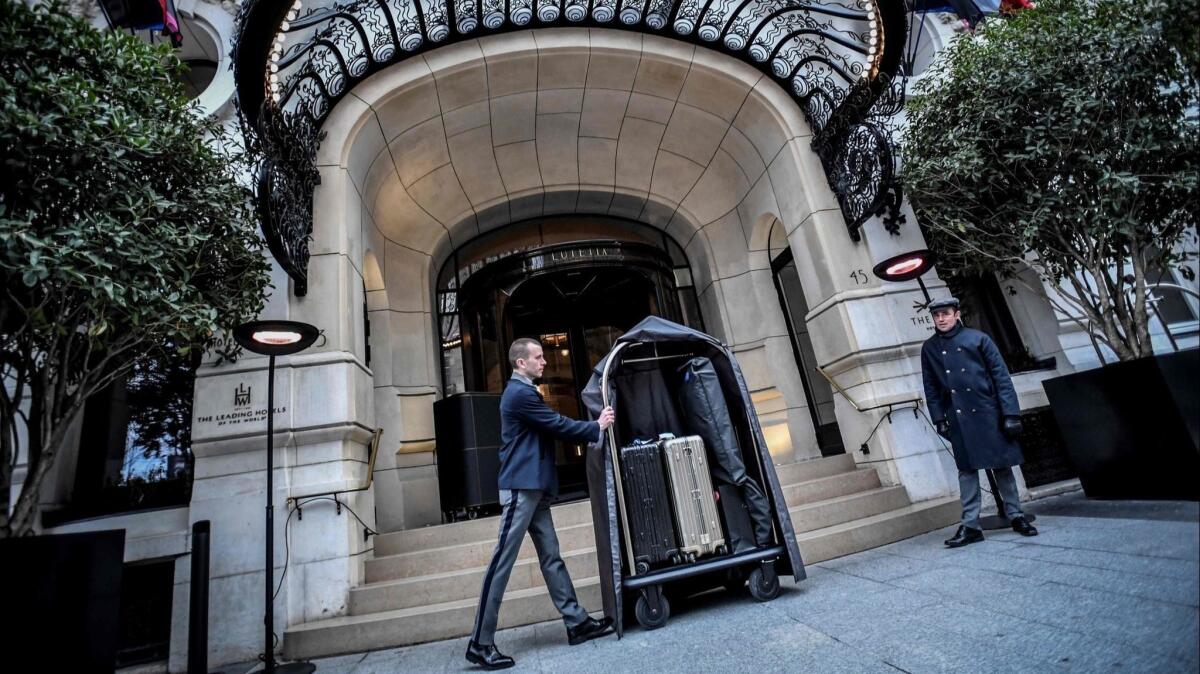
What you could be reading
If you would like to subscribe to this newsletter or many others from the Los Angeles Times for your specific interest, go to membership.latimes.com/newsletters. Here’s a bonus: They are delivered free to your inbox. We thank you for your readership and hope you will find these handy compilations of news and features rewarding. If you do not, let us know that too by writing to travel@latimes.com.
If you have comments or suggestions on this newsletter, send them to travel@latimes.com. Tell us what you like and what you don’t like — big gas bills thanks to the prolonged cold, sardines, and people who think they can walk through the wildflowers because they are special — along with anything that pertains to what you’re reading or what you’d like to be.
End paper
There are wildflower purists — I think Mary Forgione, our assistant travel editor and all-around outdoorsperson might be one — and then there are people like me who think any flower is a good flower, even if it’s an organized showing. I do feel that jolt of hope when I see the jasmine starting to bloom from its place on the arch across the walkway and the buds on the roses (which are late this year — maybe they just didn’t want to compete with the wildflowers).
I don’t just stop for flowers; I have been known to travel for them to places big and small: Royal Botanic Gardens, Kew just outside London; almost anywhere in Ireland; Winterthur in Delaware; Keukenhof in the Netherlands; the cherry blossoms in Washington, D.C.; the garden at the Inn at Kulaniapia Falls on Hawaii Island. And on and on.
I hold dear a trip to see the daffodils in Pierce County, Wash., many years ago. The American Cancer Society calls daffodils the flower of hope, and many of the blooms from Washington state in those days ended up going to the cancer society for its sales. I didn’t know this before that journey, but I had bought some for my mom. One of the field’s owners in Pierce County told me they likely came from his farm or one nearby. I was seeing the origin of those yellow bundles of hope meant to lighten the spirit of my mom who, at 82, seemed unlikely to survive a second cancer diagnosis. They gave both of us hope. She kicked cancer’s butt and lived to 95.
So, yes, flowers, give us your best shot of dopamine, oxytocin and serotonin. Yes, Mother Nature, bring on the poppies, the lupine, the Indian paintbrush; show us the azaleas; the forsythia, the lilacs. And flower lovers, let us watch for grape hyacinth; tulips and jonquils in bulb country and California poppies, fiddleneck and lilies in the West. Let us remember to look down from the window of the plane and see the flowering dogwood twinkling like fairy lights among the trees.
Let us imprint those memories on our brain’s hard drive, to be produced and savored on the days we need them most. They are one of the rewards of travel, whether to the deserts of Southern California or the breathtaking gardens of the Netherlands.
And remember, above all, to travel safely and well and know that we will be here to welcome you — and your memories — home.
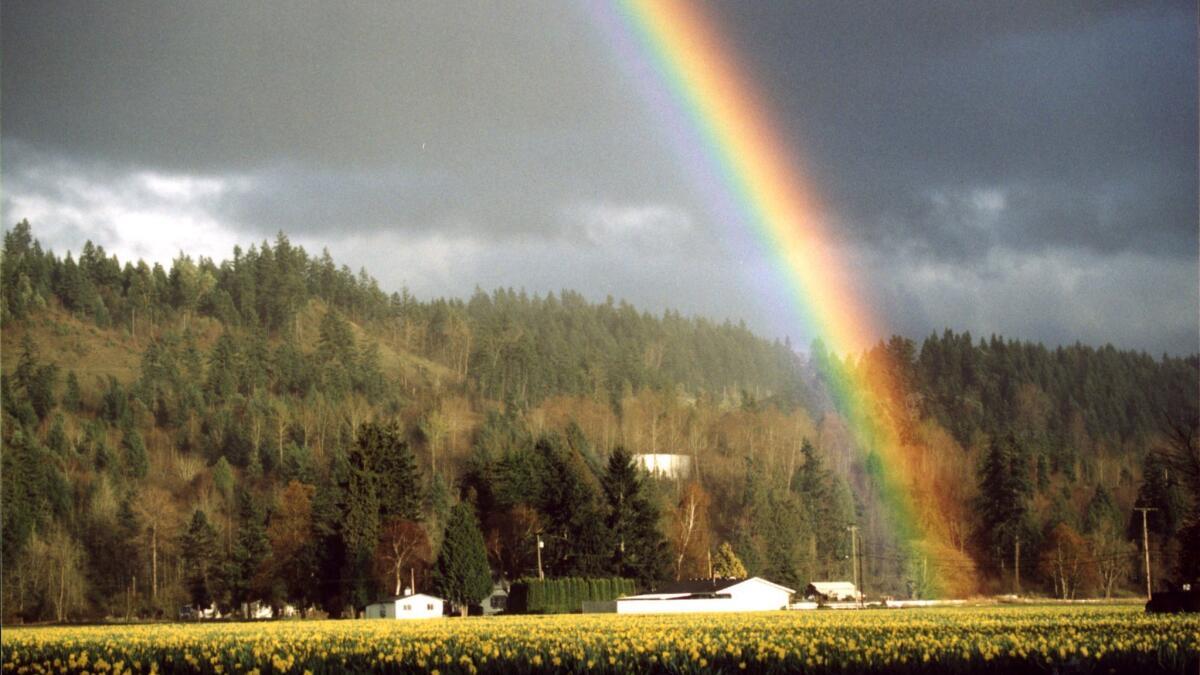
More to Read
Sign up for The Wild
We’ll help you find the best places to hike, bike and run, as well as the perfect silent spots for meditation and yoga.
You may occasionally receive promotional content from the Los Angeles Times.







